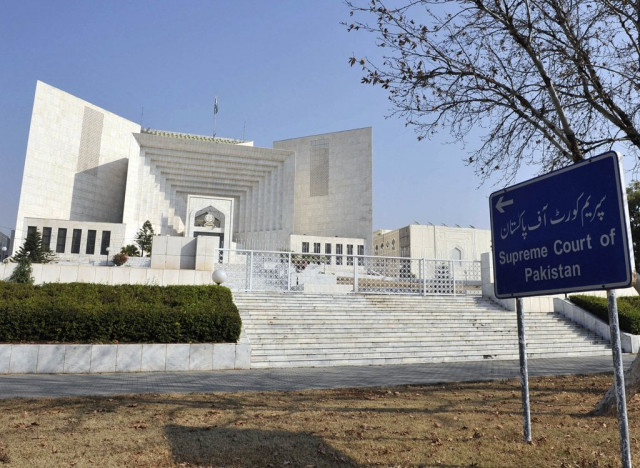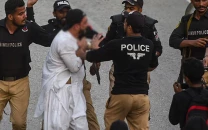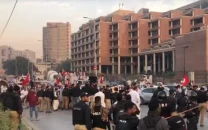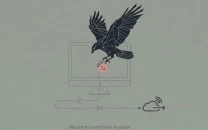Constitution reigns supreme
Apex court nullifies NA speaker’s ruling, reinstates assembly, orders voting on no-confidence motion tomorrow

In a landmark unanimous ruling, the Supreme Court on Thursday set aside National Assembly Deputy Speaker Qasim Suri’s ruling to dismiss the no-trust resolution against Prime Minister Imran Khan and the subsequent dissolution of the lower house of parliament by President Arif Alvi on the premier’s advice.
“The ruling of the deputy speaker of the National Assembly in relation to the resolution for a vote of no-confidence against the prime minister under Article 95 of the Constitution are declared to be contrary to the Constitution and the law and of no legal effect, and the same are hereby set aside,” the top court said in its short order.
The 5-0 ruling ordered parliament to reconvene on Saturday (tomorrow), no later than 10:30am, saying that the session could not be prorogued without the conclusion of the no-trust motion against PM Imran.
“It is declared that the resolution was pending and subsisting at all times and continues to so remain pending and subsisting.”
The apex court ruled that President Alvi’s decision to dissolve the National Assembly was also "contrary to the Constitution and the law and of no legal effect". It noted that the prime minister could not have advised the president to dissolve the assembly as he continued to remain under the bar imposed under Clause (1) of Article 58 of the Constitution.
The court’s verdict restored the prime minister and his cabinet to their positions. "In consequence of the foregoing, it is declared that the prime minister and federal ministers, ministers of state, advisers, etc. stand restored to their respective offices."
"The deputy speaker gave a ruling on April 3. Leave was granted on the no-confidence motion on March 28. The ruling of the speaker is declared unconstitutional," declared Chief Justice of Pakistan Umar Ata Bandial, who was heading a five-judge larger bench, which also comprised Justice Ijaz-ul-Ahsan, Justice Mohammad Ali Mazhar, Justice Munib Akhtar and Justice Jamal Khan Mandokhail.
The court stated that the current order would not impact the proceedings under Article 63 of the Constitution.
"It is, however, clarified that nothing in this short order shall affect the operation of Article 63A of the Constitution and consequences thereof in relation to any member of the Assembly if he votes on the Resolution or (if such be the case) the election of a Prime Minister thereafter in such manner as is tantamount to his defection from the political party to which he belongs within the meaning of the said Article," the verdict read.
Earlier during the proceedings, the chief justice noted that it was clear that the deputy speaker’s April 3 ruling, which dismissed the no-confidence motion against PM Imran, was “erroneous”.
"The real question at hand is what happens next," he added.
“Now the PML-N counsel and AGP [attorney general for Pakistan] Khalid Jawed Khan will guide the court on how to proceed further.”
The chief justice remarked that the court had to look at national interest. Before reserving the verdict the court gave the rostrum to opposition leader Shehbaz Sharif.
The chief justice observed that the value of rupee against the dollar had reached Rs190 in the country.
"We need a strong government. This will be an uphill task for the opposition leader," he added.
Shehbaz responded that he had one request: “Restore the National Assembly.”
He requested the court to restore parliament for the sake of the Almighty and Pakistan. “Let us vote for the no-confidence motion."
Justice Mandokhail observed that the opposition wanted to conduct elections from day one. “What is the issue now?”
The PML-N president responded that the problem concerned violation of the Constitution. To this, the judge told him that the court would repair the Constitution.
The AGP said everyone wanted a prime minister elected by the people, not the assembly.
"Would those who got rid of Imran Khan spare Shehbaz Sharif?" he asked.
The AGP added that if the opposition's election demand was being fulfilled, the court should let that happen.
However, PML-N lawyer Makhdoom Ali Khan alleged that the AGP's concluding remarks sounded like a threat.
"The stock market has crashed, dollar is expensive and rupee's value has fallen,” the lawyer noted.
The AGP, while presenting his arguments, claimed that the no-confidence motion against PM Imran was “dismissed” on March 28, when leave was granted to table the resolution. “It is important to show the support of majority at the time of tabling the resolution,” he added.
He contended that as the opposition had 161 members in favour of tabling the motion on March 28, the move had failed back then.
Justice Akhtar replied that according to this line of argument, if 172 members had approved the motion, the prime minister would have been ousted.
To this, the AGP said the three to seven days mandated by the Constitution before a final vote on the resolution was to give the prime minister a chance to win back angry lawmakers.
The CJP interjected that 172 members were not required at the leave grant stage. "They are required at the time of the voting."
He added that if the speaker had approved the resolution on March 28, then that was the end of the topic. “The speaker's counsel said his ruling can't be reviewed.”
The AGP replied that if that was the case, the case was over since April 3 when the speaker had passed the ruling to dismiss the motion.
However, the CJP noted that that he wanted to hear from the AGP on the main issue – the dissolution of the assembly.
"The assembly was dissolved only after the no-confidence motion was dealt with," the AGP replied.
The CJP noted that the court would have to the time difference between dissolving the assembly and the ruling of the speaker. Justice Mandokhail observed that the court could not decide on the basis of circumstances and results
"The court has to pass a verdict keeping the Constitution in view," the judge said. "This way, any speaker who comes tomorrow will do as he pleases."
The AGP responded that he was not defending the speaker's ruling. "My concern for now is the new elections," he added.
Earlier, the AGP informed the court that he would not be able to give details of the recent meeting of the National Security Committee in an open courtroom.
The attorney general further told the court that there was no "firewall" that gave complete immunity to parliamentary proceedings.
"The court will decide the extent to which parliamentary proceedings can be reviewed," he added.
Justice Mandokhail noted that even though Suri announced the April 3 ruling which dismissed the no-confidence motion against PM Imran, it was signed by Speaker Asad Qaiser.
He made the observation as Suri and Qaiser's lawyer, Naeem Bukhari, presented his arguments.
Responding to the judge's statement, Bukhari replied that perhaps the documents given to him might not be "original".
Justice Mandokhail further pointed out that the minutes of the parliamentary committee meeting, which were submitted to court by Bukhari, did not prove if the deputy speaker was present there.
The judge further asked whether the foreign minister was present during the parliamentary committee meeting, noting that his signature was not included in the record.
“Shouldn't the foreign minister have been present?" the judge asked, which prompted the lawyer to admit the minister should have been there.
The CJP noted that the name of the national security adviser at the time, Moeed Yusuf, was also not included in the record.
Read SC will only focus on Suri’s ruling: CJP
Senator Ali Zafar, the president's counsel, was asked by Justice Miankhel if the prime minister was the people's representative. The lawyer replied in the affirmative.
Justice Miankhel then inquired if the premier would be protected if the Constitution was violated in parliament. "Is parliament not the guardian of the Constitution?" he asked. He also questioned how justice would be awarded in case someone is affected due to parliamentary proceedings.
Zafar replied that the Constitution must be protected in accordance with the rules it underlines.
The CJP then asked what would happen when an injustice was carried out against the entire assembly, not just one member.
"Can parliament interfere if there's a conflict between judges," Zafar made a counter argument. "The answer is no. The judiciary has to settle the matter. It can't interfere just like parliament can't.”
Zafar also referred to former PM Mohammad Khan Junejo's case, who was dismissed by ex-president Gen Ziaul Haq. "Junejo's government was dissolved and the court declared it unconstitutional," Zafar said, adding that the court did not interfere in actions taken after the dissolution of the assembly.
However, Justice Miankhel said that the matter at present concerned the no-confidence motion. "A ruling came after the motion. Address this issue," he told Zafar.
The CJP also said that the verdict he was referring to was related to the oath. "Here the matter is about the ruling, not the oath. We have to draw a line somewhere."
However, Zafar argued that in this case too elections were announced after dissolving the assembly.
At one point, the CJP asked Zafar why he wasn't explaining whether or not there was a constitutional crisis in the country. "If everything is happening according to the Constitution, where is the crisis?" he asked.
Read more Opposition cries foul after dismissal of no-trust vote
Zafar replied that he was also saying the same and there was no constitutional crisis in the country.
The CJP also observed that there seemed to be a violation of Article 95. He noted that holding elections cost the nation "billions of rupees".
However, Zafar argued that the announcement of the election showed there was no malice behind the government's move.
Imtiaz Siddiqui, the lawyer for interim PM Imran, said the judiciary had not interfered in parliamentary proceedings in the past.
"The matter at hand concerns NA proceedings. [However] NA proceedings lie beyond the judiciary's jurisdiction," he contended, urging the court to tell parliament to settle its own matters. He said that the opposition had not objected to the deputy speaker chairing the session.
"The deputy speaker made a decision according to what he thought was best," Siddiqui argued, adding that the deputy speaker was not accountable to the court for the ruling he gave. He reiterated that under Article 69, the apex court could not interfere in parliamentary proceedings.
Justice Akhtar noted that verdicts referenced concerned observations made by the courts. "The court is not bound by the observations given in the verdicts," he said.
Siddiqui stated that the deputy speaker had relied on the assessment of the National Security Committee, adding that no one could influence the top forum.
The CJP asked when were the minutes of National Security Committee meeting were presented before the deputy speaker. Siddiqui said that he unaware about matters concerning the deputy speaker, which prompted the court to tell the lawyer to refrain from talking about things he was unaware of.
"According to you, the deputy speaker was in possession of material on the basis of which he delivered his ruling," CJP Bandial observed, asking what would be the consequences of the premier violating Article 58.
He also observed that Suri had not objected to voting on March 28 but had passed the ruling on April 3. "Why did the deputy speaker not dismiss the no-trust motion on March 28?"
Justice Ahsan remarked that if the assembly was not dissolved, the House could have suspended the deputy speaker's ruling. "The prime minister took advantage of the situation and dissolved the assembly," he added.
Reaction
The decision was met with jubilation in various cities and tow nsof the country -- with cars loaded with opposition supporters racing through the streets and loudly blaring their horns.
The outpouring of public emotions after the court's decision did not come because they admired the prime minister, but because of their growing frustration and disgust with what many people considered the premier’s abuse of his powers.
The country had plunged into a political crisis last week after the prime minister had claimed that the opposition had colluded with the US for a "regime change" and on that pretext, the deputy speaker had refused to allow the opposition’s no-confidence motion on April 3.
The president had also dissolved the assembly on the advice of the premier, meaning general elections had to be conducted within 90 days.
Security was on red alert in the federal capital at the time of the announcement of the decision.
nauthorised people were barred from entering the Red Zone, especially Constitution Avenue.
According to police sources, only people concerned could enter the Red Zone after showing their cards.
Police were ordered to increase patrolling on highways and intersections. The traffic police were directed to maintain traffic flow.
(With input from agencies)


















COMMENTS
Comments are moderated and generally will be posted if they are on-topic and not abusive.
For more information, please see our Comments FAQ